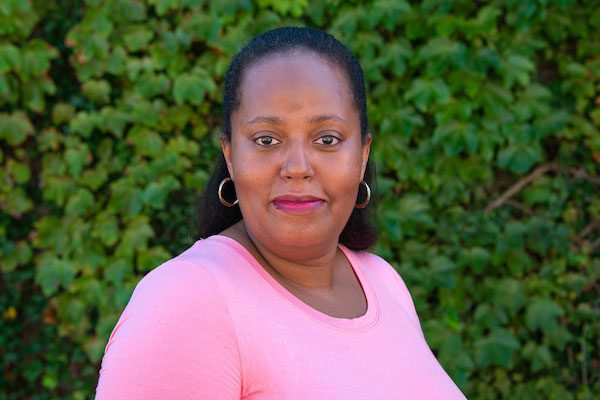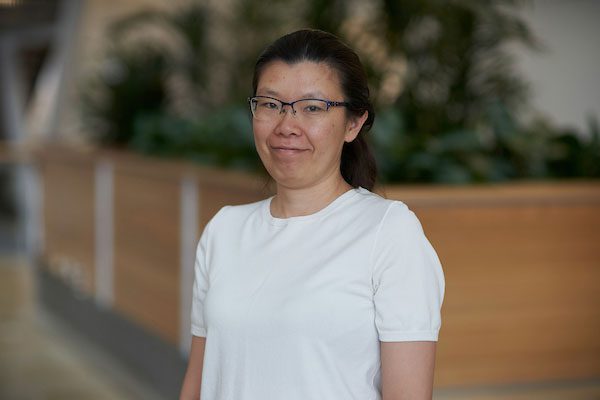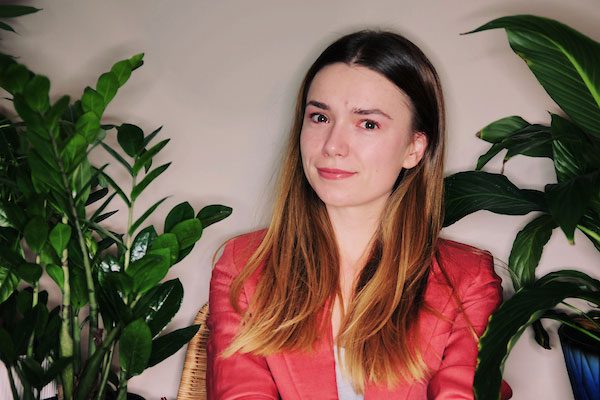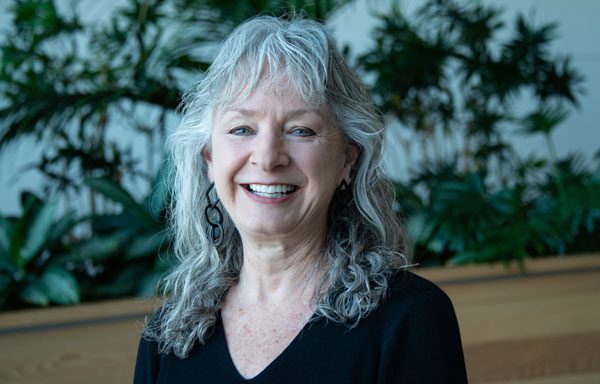Celebrating Women in Science at the Danforth Center
In celebration of International Day of Women and Girls in Science, we spoke to a few of many inspiring women scientists at the Danforth Center about their research, their advice for women and girls interested in plant science, and how they hope to see the plant science field evolve. Meet Tessa Burch-Smith, PhD, Teng Chong (TC), Anastasiya Klebanovych, PhD, and Toni Kutchan, PhD. While their research, experiences, and backgrounds are unique, they all share a passion for using plant science to improve the human condition and a vision for a more diverse, equitable, and inclusive plant science field.

Dr. Tessa Burch-Smith, Associate Member at the Donald Danforth Plant Science Center
Tessa Burch-Smith, PhD
Tessa Burch-Smith, PhD, is an Associate Member at the Danforth Center. Her research is centered on intercellular communication in plants via pores called plasmodesmata, since plant cell walls limit interactions with the cell membrane and the movement of the cells. “Currently my research focuses on three overlapping areas: elucidating how chloroplast signals influence plasmodesmata, investigating the role of plasmodesmata in plant-virus interactions, and understanding how plasmodesmata form across existing cell walls,” she explains. Tessa and team are shedding light on two important plant biology topics: how different parts of a plant exchange signaling molecules and metabolites, and how viruses interact with their hosts to cause disease.
Was there a woman that played an important role in your science career?
Between the ages of five and fifteen, I only had one science teacher who was not a woman. Even as an undergraduate, many of my science professors were women, and thus, I viewed becoming a scientist as a realistic goal. In particular, my postdoctoral advisor, Dr. Patricia Zambryski, was quite influential in shaping my current research direction and mentoring approach. She modeled for me that care of the whole individual is essential for producing creative and enthusiastic scientists, and I try to emulate this in my own mentoring.
What is your advice for women and girls that are interested in pursuing science?
I would advise them that there is room for them and their ideas in science. Reading the history of science and seeing the representation in pop culture, one gets the impression that science is not the place for women, but this is simply not true. Seek mentors and advisors who believe in your abilities and then trust your judgment. Your skills, talents and opinions are as valid and valuable as anyone else’s.
How do you hope to see the plant science field change during your career?
Women make up 40 percent of the global agricultural workforce according to recent estimates. As plant scientists, we should strive to include more women and marginalized voices in decision making and in guiding the direction of our research. Further, I hope that plant science becomes a truly global endeavor as we strive to address the challenges to food and crop production that affect all people. I also hope that we conduct more research in the crops that we use for food and so many other products, and that we begin to deploy solutions to the conservation challenges we face.

Teng Chong (TC), Research Scientist in Dr. Blake Meyers’ Lab
Teng Chong
Teng Chong (TC) is a Research Scientist in Dr. Blake Meyers’ Lab. As part of the Meyers lab, TC uses experimental and computational approaches to study plant reproduction and fertility to enhance yield gains in crop plants. “Using CRISPR-Cas9 and high-throughput sequencing technologies, I'm part of a team working on small RNA cohorts ensuring pollen production in maize, which could be useful to achieve hybrid vigor,” says TC. Ultimately, TC’s research could help plant breeders improve crops and provide more nutritious food for communities around the world.
Was there a woman that played an important role in your science career?
All of the women I work with are amazing and I learn good things from all of them everyday, and I am grateful. In South Korea, my role model is Dr. Narry V. Kim, who was a pioneer in microRNA biology early in her career. In early 2020, she led a team that was the first to decode the whole virus genome that causes COVID-19, which was then used for medicine development. She set an example how frontier scientific research can solve real problems.
What is your advice for women and girls that are interested in pursuing science?
Science can be fun and useful. Science needs people and resources to develop, and it also could lead to diverse related career paths. Anybody interested could consider applying to work or intern at the Danforth Center.
How do you hope to see the plant science field change during your career?
I hope to see more people with diverse backgrounds joining us, to make novel discoveries and carve a sustainable future!

Anastasiya Klebanovych, PhD, Research Associate in the Advanced Bioimaging Laboratory
Anastasiya Klebanovych, PhD
Anastasiya Klebanovych, PhD is a Research Associate in the Advanced Bioimaging Laboratory. “I facilitate and guide light microscopy experiments for researchers at the Danforth Center from the image acquisition using state-of-the-art microscopy tools, to image data processing and analysis,” explains Anastasiya. “I work with super-resolution microscopy, which can overcome the physical limits of light microscopy, making us see and resolve structures we could not before.” By discovering how plants live and grow through first-hand observation, the work of Anastasiya and the ABL furthers our knowledge of our world and helps us understand how plant science can be used to create a more sustainable future.
Was there a woman that played an important role in your science career?
I am so lucky to get support from many inspirational, kind, and wise women, who supported academic endeavors throughout my whole life and scientific career! Among those women is my great grandmother, Nadiya (the name stands for “Hope”), who was thirsty for knowledge but was not allowed to finish her primary school as a child. She always cheered for me and encouraged me to move forward despite all the obstacles.
What is your advice for women and girls that are interested in pursuing science?
As trivial as it sounds but do ask for help and you will be surprised how many people will respond. And most important, during the undergraduate/graduate path do not be afraid to change the scientific field of research or project!
How do you hope to see the plant science field change during your career?
It would be very exciting to keep translating our research into the fields and grocery shelves, convincing people that sustainable agriculture is the future.

Toni Kutchan, PhD, vice president for Research and Oliver M. Langenberg Distinguished Investigator at the Donald Danforth Plant Science Center
Toni Kutchan, PhD
Toni Kutchan, PhD, is the Oliver M. Langenberg Distinguished Investigator, and Vice President for Research at the Danforth Center. Toni and her lab focus on the many chemicals that plants make. “These are substances that, for example, give flowers lovely color, herbs and spices wonderful aroma, coffee and tea that special kick,” she explains. Toni has also become a leading expert in the molecules derived from the opium poppy, including the lifesaving opioid antidote medications.
Was there a woman that played an important role in your science career?
I came into the scientific enterprise at a time that supported very few women scientists in professorial positions; I did not see someone who looked like me during the formative years of my career. My women friends, however, have been, and are, my most ardent supporters. They have helped me through life’s challenging times and are my joy each and every day.
What is your advice for women and girls that are interested in pursuing science?
Network, network, network. And when you have climbed the ladder of success, reach down and pull up. Then network more, but as a mentor.
How do you hope to see the plant science field change during your career?
I hope to see both equality AND equity for women in science. We still have a ways to go to achieve equity, so that women can excel and attain their full potential. The specific needs of women, in particular working moms, are not yet being wholeheartedly taken into consideration in the workplace. I hope to effect change in equity for women in the workplace.
Our education research and outreach lab is committed to inspiring the next generation of plant scientists. By creating meaningful research opportunities for students at every stage of their education, we can keep students engaged in science and help them build the foundational skills that are critical to a career in plant science. Learn more about our education research and outreach opportunities.